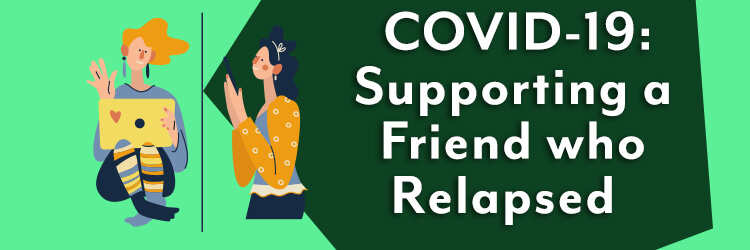[vc_row][vc_column][vc_column_text]Relapses are a normal part of recovery—but it’s common for people to feel shame about them. Shame can lead to negative self-talk like, “I’m a screw-up; I might as well ruin everything and get it over with.” Such begins a cycle of continuous relapse and lowered self-concept. Dealing with a crisis in isolation has been a recipe for increased relapses. Without interpersonal contact, the negative self-talk has less external pushback.
And it’s that very isolation that makes it harder to support a friend who has started drinking or using again. But people who have relapsed need extra care. Supporting a friend after a relapse is a powerful way to start breaking the shame cycle.
If you have a friend who relapsed during the pandemic, you can provide support without in-person contact. A bigger barrier might be knowing whether or not your friend relapsed in the first place. Because of the shame factor, people might keep relapses a secret. If you and the friend are both sober, they may be especially reluctant to tell you. They might worry they’ve “failed” or let you down.
It’s tricky to try to discern if a friend has relapsed based on limited information. You don’t want to pry or come off accusatory. Plus, it is harder to tell from afar. For example, your friend may not be keeping the same level of contact they did before—but during an ongoing crisis, everyone deals and communicates differently.
That said, you know your friend. If something feels off, communication is key. I wouldn’t suggest point-blank asking your friend if they’ve relapsed. No matter your intentions, this could make a person feel defensive. Instead, provide an opening for your friend to share if they are ready. This could be a message like, “I’ve noticed you haven’t been reaching out. I just wanted to let you know that you if you are going through something and need a friend, I’m here to support you without judgement.”
It’s always a good idea to regularly check in with all your sober friends, even if you think they’re doing fine. This is a hard time for everyone—and you never know what someone is going through.
If you’ve established that your friend has relapsed, checking in regularly is extra important. It’s okay to ask them specific questions about what you can do to support them. Everyone is different. If you’re operating based on some idea of a standard, your friend isn’t going to feel individually cared for. You might get really specific.
For example, ask what times of day are particularly hard for your friend. Then, if you can, schedule video chats with them at those times. If you are unable, send them encouraging messages at that time of day. If their difficult time is late at night and you go to sleep early—or some other conflict—you can even schedule texts to send. That might seem robotic and antithetical to connection, but it can be a reminder to your friend that you are here and support them. You could even make a joke of it, acknowledging that you are not awake right now in the text.
While relapses are nothing to be ashamed of, they are serious. OD’s happen more often during a relapse; a person may take the same amount they did before their tolerance dropped. If your friend trusts you enough to divulge their relapse, they trust you enough to know that you want what’s best for them. Hopefully they will take your advice seriously. Encourage them to seek therapy or treatment. Most therapists are offering telehealth options. And addiction treatment is still running—knowing that what keeps us safe from the virus is not the same as what keeps us safe from our addictions.
If you or a friend have relapsed, there is hope. TruHealing Centers is open and here for you during this difficult time, with hospital-grade sanitization of all our facilities to make sure you feel safe getting treatment. At all of our recovery centers across the country, we create an individualized treatment plan, with comprehensive aftercare and relapse prevention programs. You can thrive in long-term recovery; we will help you get there. To find out more, call an admissions specialist at 410-593-0005. [/vc_column_text][/vc_column][/vc_row]









